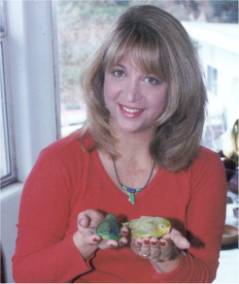Hello!
I have a parrotlet that's nearing a year in age. He was purchased from a breeder, and he's generally a well-behaved bird (he doesn't bite, but he has chewed a few of his chest feathers. It started about when we moved into our new apartment a month ago.) Our only real continuing issue is that he wants to fly away whenever he's on your shoulder, or you go to pick him up if he's perched on something. Sometimes saying "step up" first will keep him from doing it, but most of the time it doesn't. It makes it hard to keep him out for long periods, because he wants to flutter over to the cat bed, or under the computer desk, etc. He will always step up when you go to get him, he doesn't bite, and he likes to cuddle some, but I was wondering how to go about teaching him to not do this. I don't want him to get hurt, and I think he'll enjoy us, and we'll enjoy him more, if half our time together out of the cage isn't spent hunting him down as he cruises across the floor or goes to harass the cats. He absolutely loves for me to talk to him through his cage bars, will fluff and coo and mimic noises I make, but once out of the cage, he seems to care more about seeing how far he can flutter and who he can bother.
-Elodie
Dear Elodie:
Thank you for your email. You don’t mention how long you’ve had the bird and that can make a difference in my opinion about his behavior. I will say that moving is stressful for birds and very often does result in behavioral issues including feather destructive behaviors, aggression or handling. I would make sure the bird’s wings have not grown out and are still clipped. If he has recently molted, the feathers will grow back and he could simply be using his nature-given talents of being able to fly. If the wings are still sufficient clipped, then this is simply a matter of continued training. There are no magic words or special tricks, just consistency, patience and performance on your part. Each and every time the bird flies away, you will need to get him and put him back on your finger or perching area. This isn’t about whether or not he likes you or is a good bird, he is simply doing what Mother Nature designed him to do, fly. It’s a very strong instinct and it takes patience, training, timing and consistency in order to stop him. Again, I would check those wings and just keep working with him.
Best of luck!
Sincerely yours,
Sandee L. Molenda, C.A.S.
The Parrotlet Ranch, Owner, www.parrotletranch.com
Join the International Parrotlet Society, – the World’s Largest and Oldest Parrotlet Organization www.internationalparrotletsociety.org
A Chattering Bird Builds No Nest.
Camaroonian Phrase
Subscribe to:
Post Comments (Atom)




No comments:
Post a Comment
Note: Only a member of this blog may post a comment.